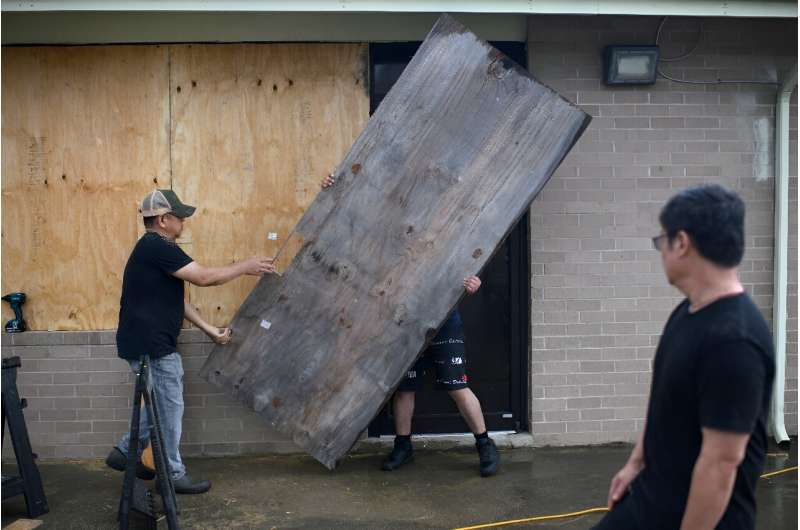This article has been reviewed according to Science X's editorial process and policies. Editors have highlighted the following attributes while ensuring the content's credibility:
fact-checked
reputable news agency
proofread
Texas hunkers down as Hurricane Beryl approaches

Beryl strengthened to a hurricane before hitting the southern US state of Texas on Monday, where some residents were evacuated over warnings of flooding and power outages.
The US National Hurricane Center (NHC) said in its latest update that winds were reaching 80 miles (130 kilometers) per hour as Beryl approached the Texas coast.
"Conditions (are) deteriorating with dangerous storm surge, flash flooding, and strong winds expected," the NHC warned early Monday.
The National Weather Service issued a tornado alert for parts of Texas including Houston, which is home to 2.3 million people.
"We have to take Beryl very, very seriously. Our worst enemy is complacency," said Houston Mayor John Whitmire.
The mayor said he wanted residents in Houston "to know the conditions that you go to sleep under tonight will not be the same that you wake up to in the morning."
Several areas of the Texas coast were under hurricane and storm warnings on Sunday. Beryl is expected to make landfall between the port city of Corpus Christi and Galveston Island early Monday.
The NHC said that rainfall of up to 15 inches (38 centimeters) is expected in parts of Texas, warning it could cause flash flooding in some areas.
Authorities in Nueces County, home to Corpus Christi, asked tourists to leave the city, while neighboring Refugio County—yet to fully recover from Hurricane Harvey in 2017—issued a mandatory evacuation order on Saturday.
The city of Galveston, southeast of Houston, issued a voluntary evacuation order for some areas, with videos on social media showing lines of cars heading out of town.
—'A deadly storm'—
Acting State Governor Dan Patrick called on Texans to stay alert, listen to local officials and leave the danger zone if possible.
"It will be a deadly storm for people who are directly in that path," Patrick told a state emergency management news conference.
"Trust me, you don't want to be in a Category 1," he added, referring to the lowest hurricane level.
Beryl left at least seven dead after it tore through the Caribbean and Venezuela, with winds at times reaching Category 5 strength.
It hit Mexico as a Category 2 hurricane on Friday, flattening trees and lampposts and ripping off roof tiles, according to its civil protection authority, though there were no reported deaths or injuries there.
Before that, it hit the Cayman Islands and Jamaica, slamming Grenada, St Vincent and the Grenadines, as well as Venezuela.
Beryl is the first hurricane since NHC records began to reach the Category 4 level in June, and the earliest to hit the highest Category 5 in July.
It is extremely rare for such a powerful storm to form this early in the Atlantic hurricane season, which runs from early June to late November.
Scientists say climate change likely plays a role in the rapid intensification of storms like Beryl, since there is more energy in a warmer ocean for them to feed on.
North Atlantic waters are currently between two and five degrees Fahrenheit (one to three degrees Celsius) warmer than normal, according to the US National Oceanic and Atmospheric Administration.
© 2024 AFP




















